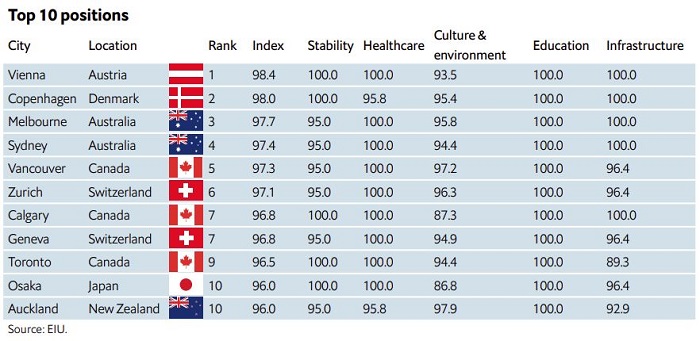As the world comes out of the pandemic, healthcare has made maximum gains in the latest edition of EIU’s Global Liveability Index, which is also the highest in 15 years.
The Global Liveability Index provides an assessment of cities around the world based on over 30 qualitative and quantitative factors across five broad categories: stability, healthcare, culture and environment, education and infrastructure. The survey now covers 173 cities (including Kyiv, Ukraine), up from 140 cities in 2022.

The findings of the 2023 survey reveal that the average index score has risen to 76.2 (out of 100), up from 73.2 a year ago. ‘Optimism amid instability’ is the fundamental message from the survey findings, with Vienna retaining its top position; Melbourne and Sydney bouncing back up the rankings to third and fourth place; Asia-Pacific cities accounting for 8 of the top 10 movers up the rankings; and several cities in Asia, the Middle East and Africa showing improved healthcare and education scores.
While Western European cities took a dive in the rankings from rising workers’ strikes and civil unrest, the region still accounted for 4 of the top 10 cities in the Index.
A combination of stability, good infrastructure, strong education and healthcare services, and plenty of culture and entertainment helped Vienna (Austria) regain its top position in the 2023 rankings as the most liveable city in the world, followed by Copenhagen (Denmark) in second place.
Melbourne and Sydney (Australia) moved to third and fourth place, dislodging Frankfurt and Amsterdam. Three Canadian cities, Vancouver, Calgary and Toronto took out the fifth, seventh and ninth positions respectively. Zurich and Geneva were placed sixth and seventh respectively, with Osaka (Japan) and Auckland (New Zealand) sharing the tenth spot.
Australian cities Perth and Adelaide share the 12th spot in the 2023 Index. New Zealand cities, which took a dive in the 2022 rankings due to frequent Covid-related lockdowns, have recovered well with Wellington moving up 35 places to 23rd, and Auckland by 25 places to enter the Top 10.
The Middle East region reflected improved liveability scores, largely due to strong gains in healthcare and education ratings. Riyadh and Jeddah in Saudi Arabia rose by five places while Abu Dhabi in the UAE showed improved scores, helping it achieve the top-tier status of liveability.
Key highlights of the Global Liveability Index report:
- Wellington is the biggest mover up the rankings, rising 35 places to 23, followed by Auckland, rising 25 places to 10, and Perth (Australia), moving up 21 places to 12.
- Hanoi (Vietnam), Kuala Lumpur (Malaysia), Jakarta (Indonesia) and Hong Kong are among the Top 10 biggest movers of 2023.
- Edinburgh (UK) took the biggest fall, moving down 23 places to 58, followed by Stockholm, which dropped 22 places to 43.
- Two US cities, Los Angeles and San Diego, both dropped 17 places to 57 and 61 respectively.
- Manchester and London are the other UK cities, which showed a significant drop in rankings, falling 16 and 12 places respectively.
- Kyiv (Ukraine) has entered the list of the bottom 10 cities in the Index, with the war causing significant damage to its stability, infrastructure and liveability.
- Damascus (Syria) and Tripoli (Libya) continue to be at the bottom of the Index, held back by social unrest, terrorism and conflict.
- Stability has been the biggest loser globally for reasons ranging from civil unrest, wage strikes and worker protests to increasing discontentment and crime.
“The removal of Covid-related restrictions has overall boded well for global liveability in 2023. Education has emerged stronger with children returning to schools alongside a significantly reduced burden on hospitals and healthcare systems, with some notable improvements in cities across developing economies of Asia and the Middle East. As the world’s political and economic axis continues to shift eastwards, we expect the cities in these regions to move slowly up our liveability rankings,” Upasana Dutt, head of liveability index at EIU, said.
Image: EIU.com/ Getty Images

